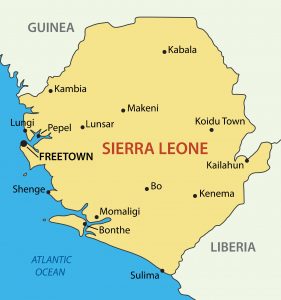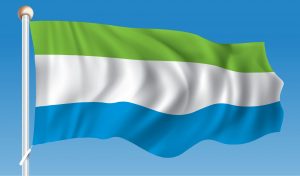 Sierra Leone is on the West Coast of Africa bordered by Liberia and Ghana. It has a tropical climate and diverse environment ranging from Savannah to rain forest. The country is one of the smallest republics in Africa and with its coastal rainfall it is one of the wettest.
Sierra Leone is on the West Coast of Africa bordered by Liberia and Ghana. It has a tropical climate and diverse environment ranging from Savannah to rain forest. The country is one of the smallest republics in Africa and with its coastal rainfall it is one of the wettest.
European contact began in 1462 with the Portuguese explorer Pedro da Cintra, who gave the mountainous Peninsula the name Sierra Leone (“Lion Mountains”).
From the 16th to the early 19th century, the region was raided for slaves for the Atlantic trade. During the 17th century Portuguese influence waned and made way for British Imperialism and the international slave trade, during which thousands of Africans were taken from their countries and shipped to locations in North America and the West Indies where they were forced into a life of hard labour and poverty. This history is well documented on Bunce Island (where the slaves were held prior to being shipped) and the museum in Freetown (capital of Sierra Leone). In the 18th century British philanthropists campaigned for Freetown to become a homeland for freed slaves.
 Sierra Leone became an independent sovereign state in 1961 and a republic in 1971. Like many other African nations the history is complicated and characterized by colonization and civil war. Currently the country is struggling to grow its economy after the devastating civil war followed by the deadly ebola virus. Although very rich in minerals and diamonds, Sierra Leone is considered to be one of the poorest countries in the world. Approximately 70% of youth are underemployed or unemployed. Illiteracy remains a persistent challenge and youth that lack that skills and education find it extremely difficult to compete for the limited jobs available. English is one of the official languages.
Sierra Leone became an independent sovereign state in 1961 and a republic in 1971. Like many other African nations the history is complicated and characterized by colonization and civil war. Currently the country is struggling to grow its economy after the devastating civil war followed by the deadly ebola virus. Although very rich in minerals and diamonds, Sierra Leone is considered to be one of the poorest countries in the world. Approximately 70% of youth are underemployed or unemployed. Illiteracy remains a persistent challenge and youth that lack that skills and education find it extremely difficult to compete for the limited jobs available. English is one of the official languages.
Sierra Leone is also known for its religious tolerance. It is a country where Muslims and Christians live side by side, intermarry and where children typically learn both Muslim and Christian prayers at school. Buses and vans show messages of religious integration on their exterior.
The people of Sierra Leone are very welcoming, courteous and friendly. The beautiful beaches were once popular tourist attractions but given the more recent difficulties tourism has suffered. Hopefully it will grow again and aid the much needed economic development of the country.


